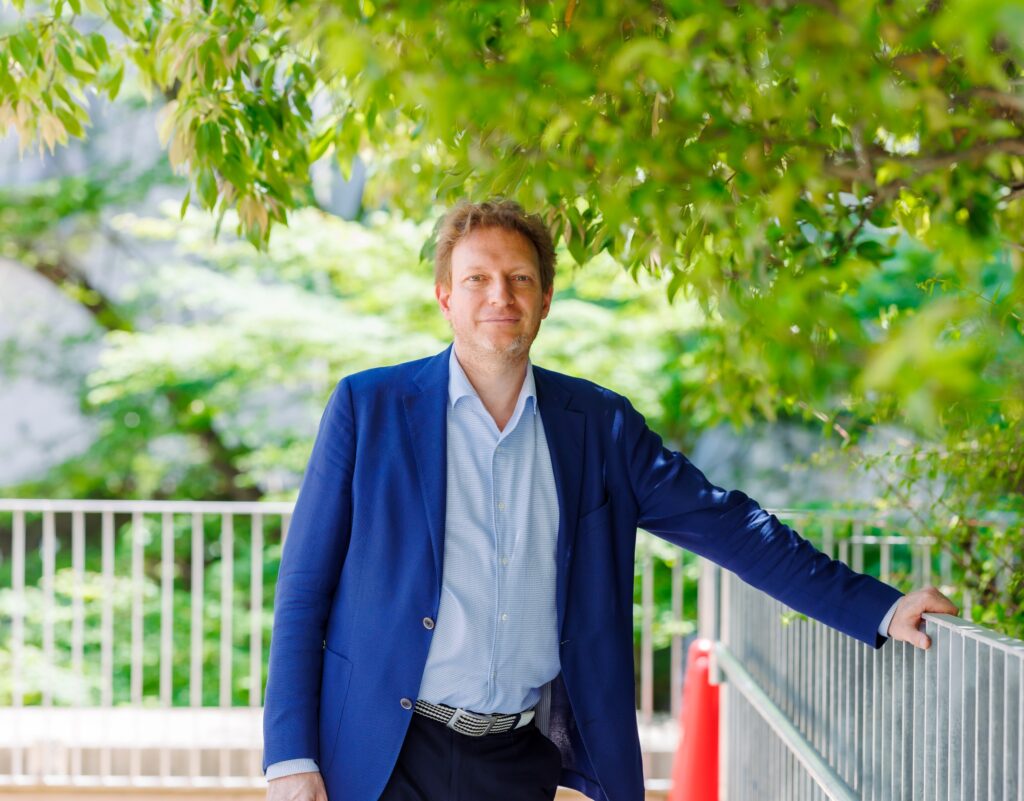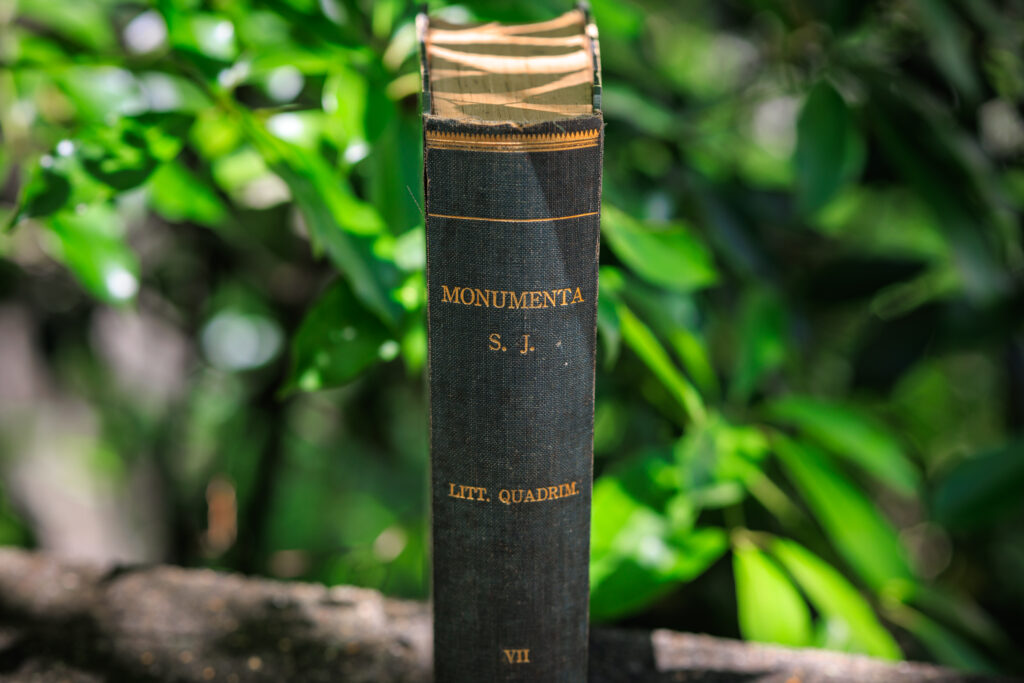
Professor Michael Desprez of the Faculty of Humanities specializes in the history of European literature focusing on theatrical works from Early Modern Europe. Through archival research, he uncovers “new” old writings to shed light on previously undiscovered plays, their material aspect (notably manuscripts) and their performances. He also discusses fascinating similarities between the Jesuit educational systems at its outset and contemporary educational practices.
I specialize in the history of European literature, particularly focusing on theatrical works from the Early Modern Europe era. There are two main approaches to studying literature: reading, performing and analyzing it, and conducting research in old archives. While searching through old archives can be demanding and time-consuming, it leads to the discovery of “new” old writings and sheds light on new elements from old writings that had gone unnoticed for hundreds of years. It is the only method capable of producing firm evidence and the building of a rigorous analytical discourse. I find myself drawn to archival work, which is akin to scientific experimentation that results in exciting new discoveries.
I search through archives across Europe to discover new titles of plays and scrutinize their manuscripts. In addition to analyzing the texts themselves, I explore stories behind these manuscripts including authors, actors and actresses involved, their familial and social background, training, and other relevant details.
Uncovering the lives of 16th century people through Jesuit college directors’ letters

Jesuit theater is one of my research interests. In the 16th century, alongside Protestant colleges, the new Jesuit order was the first to utilize theater for educational and spiritual purposes. The Jesuit theater was so successful that it eventually gained independence from the school with plays being performed on public stages outside the perimeter of schools. Furthermore, Jesuit influence gradually extended beyond the theater to other literary forms such as novels. This was particularly the case, not only in France, but also in Germany, Spain and Italy, where children of the elites predominantly participated in Jesuit colleges.
My research on Jesuit theater is closely tied to the history of the first Jesuit colleges founded in the 16th century across Catholic Europe. Numerous Jesuit disciples were sent to these colleges to serve as directors. The letters they wrote back to the Jesuit headquarters, notably in Rome, provide an invaluable account of school developments and the daily lives of the people at the colleges during these formative years. These documents encompass every aspect of college operations, ranging from student enrollment, curricula, lists of professors with their backgrounds, their psychological and academic evaluations, predication, and even topics such as witchcraft. Letters written by Jesuit missionaries in non-European regions including Japan were kept as well. A wealth of information obtained from these documents provides insights into the development of the Jesuit educational system and its influence on people’s mindset during the 16th century, a period disrupted by acute religious conflicts in Europe.
And sometimes, these letters and reports also reveal details of the plays performed at these colleges. Many of them were never officially published, making the task of uncovering their background stories quite challenging. One of my objectives is to compile a comprehensive list of all the plays performed at Jesuit colleges in France first, then in Italy and Spain.
Manuscripts by Scottish man show birth of European modern theater
In parallel, I am working with an international pluridisciplinary research team on publishing manuscripts written by William Drummond of Hawthorne, a Scottish nobleman who came to France in 1607 to study law. During his stay in a small university town called Bourges, he enjoyed going to the theater and left testimonies about the Jesuit plays he saw. These manuscripts offer valuable insights into the theatrical scene of the time and could be considered a significant contribution to the birth of “modern theater” in Europe. The plays themselves are new discoveries, and their contents were unusually intimate for the time. The dynamic nature of new thematic performances was evident, along with the diverse background of actors ranging from Italian professionals to the first female actresses in French modern theater.
Our team is trying to unveil the life stories of these actors and actresses, contextualizing the manuscripts, and examining why it became so popular in France during that time. In our research, I am responsible for examining the introduction and development of Jesuit theater as well as sections on professional theater and Italian theater.
Striking parallels between Jesuit and current educational systems
Surprisingly, many similarities can be detected between the Jesuit educational system at its outset and during the 16th century and current educational norms. Almost 50 years after the Jesuits founded their first college in the mid 16th century, they compiled documents that synthesized different teaching experiences from colleges across Europe. These documents are both efficient and comprehensive, providing a well-thought-out foundation of teaching that is applicable to the current day.
The Jesuits emphasized several key aspects, including memorization, homework assignments, group work led by designated leaders, intergroup competitions, evaluation of both students and teachers, and the development of public speaking skills. Through five decades of dedicated efforts, they accumulated a wealth of personal educational experiments, honing exceptional human resource management skills and understanding of human psychology. Remarkably, these insights and techniques remain relevant to current education. I aspire my studies on 16th-century Jesuit manuscripts will further contribute to advancement of education and the function of literature in today’s university teaching.
The book I recommend
“Litterae Quadrimestres ex Universis, Praeter Indiam et Brasiliam”
by Directors of Jesuit Colleges around Europe, published by Augustinus Avrial

The book is my current research subject. Published in the 19th century, it is a collection of letters written between 1541 and 1560 by directors of various Jesuit schools in Europe and missionaries from non-European regions, including Japan. These letters provide a comprehensive portrayal of college operations during that era and a testimony to the profound influence of Jesuit education on Europe still relevant today.
-
Michael Desprez
- Professor
Department of French Literature
Faculty of Humanities
- Professor
-
Michael Desprez received his Master’s degree in Philosophy from Oxford University in 1999 and his doctorate in performance and theatrical studies at Paris Nanterre University in 2005. After teaching at Wolfson College (Oxford), he joined Sophia University first in 2001. His main fields of research are: Jesuit education, history of theater in early modern Europe. In addition to the material aspects of theater (biographies of actors/actresses, wandering troops, places of stage performance, economic, material aspects of theatrical life, transmission and declamation of theatrical texts), he is particularly interested in the relationships between law, performance and political and religious power.
- Department of French Literature
Interviewed: May 2023